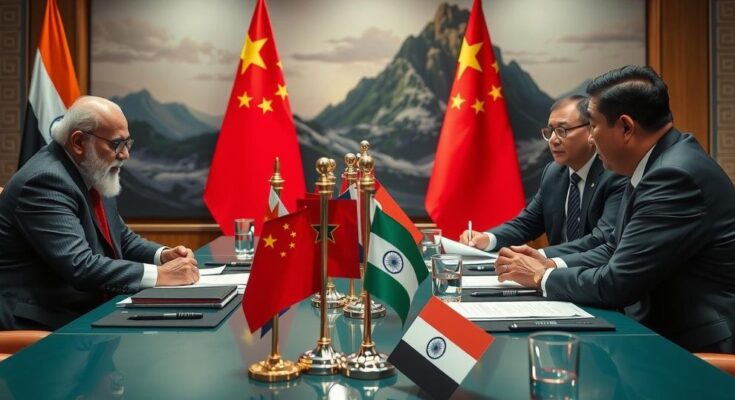Ajit Doval and Wang Yi held a significant meeting in Beijing to discuss peace along the LAC and the restoration of India-China relations after years of military tensions. The agenda includes strategies for managing border peace and addressing ongoing territorial disputes, following a recent disengagement agreement. The dialogue marks a key step towards rebuilding bilateral ties, reflecting a mutual commitment to dialogue and sincerity in resolving differences.
On Wednesday, India’s National Security Advisor Ajit Doval and China’s Foreign Minister Wang Yi convened in Beijing for discussions focused on maintaining peace along the Line of Actual Control (LAC) and revitalizing bilateral relations, which have deteriorated over the past four years due to military tensions in eastern Ladakh. This meeting marks the 23rd round of Special Representatives’ talks, occurring five years after the last dialogue held in Delhi in 2019.
The discussions started at 10 a.m. local time, with both officials addressing a range of topics aimed at restoring ties following an agreement on disengagement in eastern Ladakh established on October 21. The Chinese government expressed a positive outlook, with spokesperson Lin Jian asserting that China is willing to engage sincerely in implementing commitments made during the Kazan meeting between Indian Prime Minister Narendra Modi and Chinese President Xi Jinping at the recent BRICS summit in October.
The agenda includes strategies for managing peace along the border and seeking equitable solutions to longstanding territorial disputes, in accordance with prior agreements between the two nations. The resumption of dialogue follows an extended military standoff that began in May 2020, which escalated to a deadly confrontation in the Galwan Valley. This conflict has significantly impacted the bilateral relationship, with non-trade interactions nearly ceasing.
Despite previous challenges in resolving boundary disputes, the Special Representatives mechanism, established in 2003, serves as an important platform for addressing ongoing tensions. As both countries seek to advance stable and healthy relations, the outcome of this meeting is highly anticipated in light of recent diplomatic engagement.
This meeting between Indian and Chinese officials takes place after a prolonged period of heightened tensions following military clashes in 2020. The relationship between India and China has been strained due to a lack of dialogue and escalation of border disagreements. The Special Representatives mechanism was created to facilitate discussions and find resolutions to border issues spanning over 3,488 kilometers, emphasizing its importance in fostering communication and de-escalation. The recent commitment to re-engage diplomatically represents a significant shift in the dynamics of India-China relations.
In conclusion, the talks between Ajit Doval and Wang Yi exemplify a concerted effort to mend bilateral relations and reinforce peace along the border areas. As both nations emphasize the need for sincerity and mutual respect, the outcomes of these discussions could lay the groundwork for more stable relations moving forward. The historical context of past conflicts serves as a reminder of the challenges ahead, yet the willingness to engage demonstrates potential for resolution. This meeting is pivotal in shaping the future of India-China relations.
Original Source: www.ndtv.com




